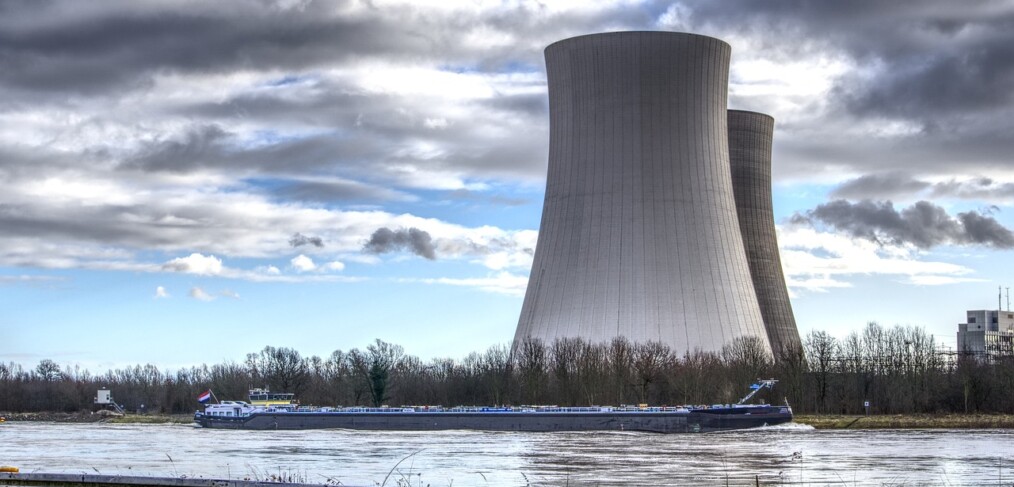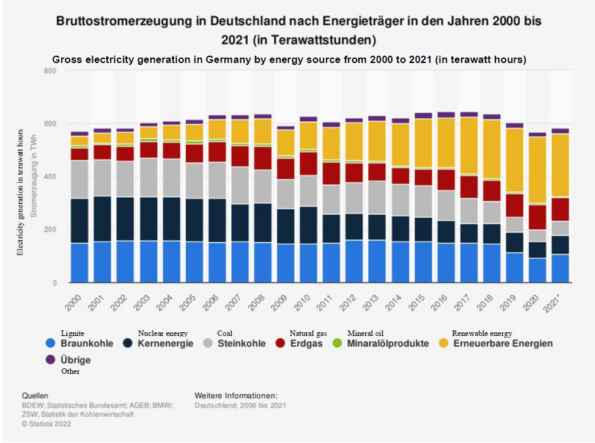
Nuclear Energy Myths
Unveiled by Jutta Paulus MEP
Myth 1 Germany has burned more coal to replace nuclear energy.
Wrong. Since 2007, the share of nuclear energy has declined, while the share of lignite use remained almost the same until 2018 whereas the share of renewable energies steadily increased.
See graph from Statista (2022): Gross electricity generation in Germany by energy carrier from 2000 to 2021 (in terawatt hours)

In 2023, the German electricity supply used less coal than in any of the last 65 years. Wind and solar power generated most of the electricity supply. Source: gruene.de (2023): Bestwerte für erneuerbare Energien bei Stromerzeugung 2023
Myth 2 Nuclear power is cost-efficient.
Wrong. The example of Hinkley Point C in Great Britain shows that building new nuclear power plants is not economically feasible and requires massive subsidies. The deal includes a loan guarantee of more than 20 billion euros to cover construction costs, state liability and responsibility for the repository of nuclear waste. The guaranteed feed-in tariff will be 11 cents per kWh (equivalent to 14 cents today) over 35 years plus inflation compensation. In comparison, a large photovoltaic system in Germany currently receives around 5 cents per kWh over 20 years – without inflation compensation. Source: International Institute for Sustainable Development IISD: The United Kingdom is to Subsidize Nuclear Power – But at what cost?
Myth 3 Phasing out fossil fuels is not possible without nuclear power.
Wrong. Results of the Greens/EFA study (2022) confirm that a very ambitious energy transition towards 100% renewable energies by 2040 is technically feasible and economically viable. The study was prepared based on real weather data with hourly resolution of solar and wind production and industrial consumption. For southern Europe, even the energy-intensive desalination of drinking water was included. Regardless of the cost issue, the construction of nuclear power plants takes far too long to make a significant contribution to achieving climate goals. The construction of Hinkley Point C was approved in 2013 and the planned completion was in 2023. The project developer Electricité de France is now expecting it to be commissioned by 2029 at the earliest and that costs will increase from the original €19 billion to €50 billion. The other European projects (Olkiluoto, Flamanville) also had to struggle with massive cost increases and construction delays. Source: Greens/EFA study (2022): Accelerating the European renewable energy transition
Myth 4 Small modular reactors (SMRs) will be cheap and widely available.
Wrong. The Federal German Office for the Safety of Nuclear Waste Management (BASE) discovered that SMR reactors become cheaper than large nuclear power plants per MW only after having been built in quantities of 3,000 or more. Otherwise, the electricity produced in an SMR would be more expensive than from “classic” large nuclear power plants. Source: Bundesamt für die Sicherheit der nuklearen Entsorgung (2024): Analyse und Bewertung des Entwicklungsstands, der Sicherheit und des regulatorischen Rahmens für sogenannte neuartige Reaktorkonzepte Although virtually no small modular reactors (SMRs) have been built worldwide, SMRs continue to dominate media headlines. The only two SMRs in operation are the twin-High Temperature Gas Cooled Reactor units in China and the twin KLT-40S units in Russia. Reports from the Nuclear Energy Agency (NEA) and the International Atomic Energy Agency (IAEA) list dozens of SMR designs being developed by private and public companies. Many of these designs have been abandoned due to technical deficiencies. In general, there is a significant discrepancy between the reality on the ground and what such agencies and the general media landscape report about SMRs. Source: The World Nuclear Industry. Status Report (2023), S. 316 The only semi-commercial project with 50% government funding in Oregon, USA was canceled due to technical problems and high costs in November 2023. Source: E&E News by Politico by Zach Bright (2023): NuScale cancels first-of-a-kind nuclear project as costs surge The alleged use of nuclear waste as fuel would require a reprocessing facility to separate the isotopes. The reprocessing plants can only recycle a small proportion and lead to further environmental problems from radioactive wastewater. Source: Greenpeace (2005): Wiederaufarbeitung: die wichtigsten Fakten
Myth 5 Nuclear power is a reliable, weather-independent energy supply, complementary to renewable energies.
Wrong. Due to disruptions and maintenance, nuclear power is on average unavailable for more than a fifth of the time, which is a record compared to other sources of electricity.
Source: DIW (2021): Zehn Jahre nach Fukushima-Kernkraft bleibt gefährlich und unzuverlässig
That things can get even worse was shown in France in 2022: up to 32 of 56 reactors were not producing and the country was dependent on massive electricity imports. One reason was the corrosion damage in several old reactors, another reason was the persistent heat wave in summer. Nuclear power plants do not cope well with the effects of the climate crisis, heat and water shortages: to run smoothly, they need mild temperatures and plenty of cooling water, usually from rivers. Not only in France that the water supply is becoming increasingly unpredictable due to the climate crisis. Source: Bündnis 90/Die Grüne: Fragen und Antworten zur Atomkraft
Myth 6 Nuclear power makes us independent.
Wrong. In 2022, 91% of uranium imports into the European Union came from Kazakhstan, Niger, Canada, and Russia. Source: Statista (2024): EU-Importe von Uran nach Herkunftsländern
Highly enriched uranium, which is needed for SMRs, can only be obtained from Russia. Source: European Parliament (2024): Strategic autonomy and the future of nuclear energy in the EU
Following the military coup in Niger in 2023, uranium exports to France were banned. France has uranium reserves left for two years. However, the coup in Niger may pose a challenge to Europe’s long-term uranium needs and impact the speed of reducing dependence on Russia. Source: Politico (2023): Niger coup sparks concerns about French, EU uranium dependency
